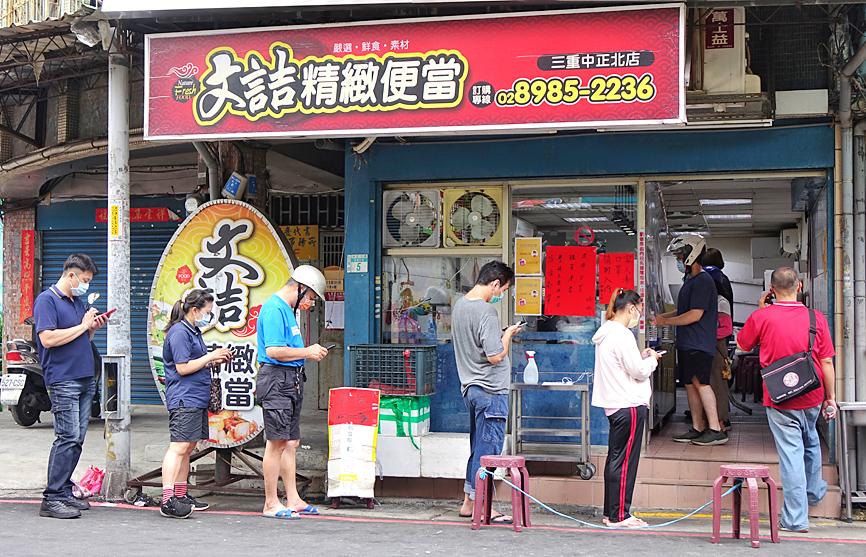Taiwan’s COVID-19 outbreak continued to batter domestic demand last month, especially in the food and beverage sector, the Ministry of Economic Affairs said yesterday.
Food and beverage sales were NT$42.6 billion (US$1.52 billion), up 11.1 percent month-on-month but down 38.8 percent year-on-year, as the nation was under a level 3 COVID-19 alert for most of the month and dine-in services only took off gradually afterward.
“In July last year, the food and beverage sector was starting a proper recovery from the initial shock of the COVID-19 pandemic,” Department of Statistics Deputy Director-General Huang Wei-jie (黃偉傑) said. “However, this July, it was still bearing the full brunt of a more serious outbreak.”

Photo: Lin Hsin-de, Taipei Times
Despite the COVID-19 alert being lowered to level 2 with the resumption of dine-in services in many cities, including Taipei and New Taipei City, Huang said that recovery of sales in the food and beverage sector would be sluggish.
“We might need to wait for the next round of stimulus vouchers before we see a more comprehensive recovery in the food and beverage sector,” Huang said.
The retail sector was also affected by COVID-19 restrictions, although to a lesser degree, the ministry said.
Retail sales totaled NT$301.5 billion, down 10.3 percent year-on-year but up 13.2 percent month-on-month, ministry data showed.
E-commerce platforms benefited from the pandemic-driven economy, with sales increasing 23.4 percent year-on-year to NT$23.5 billion, as did supermarkets, with sales rising 19.9 percent to NT$23 billion, and big-box stores, with sales rising 9.1 percent to NT$21.1 billion — each achieving a July record, the ministry said.
The nation’s wholesale sector bucked the trend by smashing a July record with sales of NT$1.063 trillion, up 11.1 percent year-on-year, which Huang attributed to continued high demand for 5G and artificial intelligence applications, and remote working devices, as well as the rising cost of raw materials.
“Most of the orders for wholesalers came from overseas amid a global economic recovery,” Huang said. “Wholesalers benefited more from overseas markets and were less affected by the local COVID-19 outbreak.”
In the first seven months of the year, food and beverage sales fell 7.4 percent year-on-year to NT$404.1 billion, while retail sales rose 3.3 percent to NT$2.22 trillion and wholesale trade increased 17.3 percent to NT$6.83 trillion, ministry data showed.

TAKING STOCK: A Taiwanese cookware firm in Vietnam urged customers to assess inventory or place orders early so shipments can reach the US while tariffs are paused Taiwanese businesses in Vietnam are exploring alternatives after the White House imposed a 46 percent import duty on Vietnamese goods, following US President Donald Trump’s announcement of “reciprocal” tariffs on the US’ trading partners. Lo Shih-liang (羅世良), chairman of Brico Industry Co (裕茂工業), a Taiwanese company that manufactures cast iron cookware and stove components in Vietnam, said that more than 40 percent of his business was tied to the US market, describing the constant US policy shifts as an emotional roller coaster. “I work during the day and stay up all night watching the news. I’ve been following US news until 3am

UNCERTAINTY: Innolux activated a stringent supply chain management mechanism, as it did during the COVID-19 pandemic, to ensure optimal inventory levels for customers Flat-panel display makers AUO Corp (友達) and Innolux Corp (群創) yesterday said that about 12 to 20 percent of their display business is at risk of potential US tariffs and that they would relocate production or shipment destinations to mitigate the levies’ effects. US tariffs would have a direct impact of US$200 million on AUO’s revenue, company chairman Paul Peng (彭雙浪) told reporters on the sidelines of the Touch Taiwan trade show in Taipei yesterday. That would make up about 12 percent of the company’s overall revenue. To cope with the tariff uncertainty, AUO plans to allocate its production to manufacturing facilities in

Six years ago, LVMH’s billionaire CEO Bernard Arnault and US President Donald Trump cut the blue ribbon on a factory in rural Texas that would make designer handbags for Louis Vuitton, one of the world’s best-known luxury brands. However, since the high-profile opening, the factory has faced a host of problems limiting production, 11 former Louis Vuitton employees said. The site has consistently ranked among the worst-performing for Louis Vuitton globally, “significantly” underperforming other facilities, said three former Louis Vuitton workers and a senior industry source, who cited internal rankings shared with staff. The plant’s problems — which have not

COLLABORATION: Given Taiwan’s key position in global supply chains, the US firm is discussing strategies with local partners and clients to deal with global uncertainties Advanced Micro Devices Inc (AMD) yesterday said it is meeting with local ecosystem partners, including Taiwan Semiconductor Manufacturing Co (TSMC, 台積電), to discuss strategies, including long-term manufacturing, to navigate uncertainties such as US tariffs, as Taiwan occupies an important position in global supply chains. AMD chief executive officer Lisa Su (蘇姿丰) told reporters that Taiwan is an important part of the chip designer’s ecosystem and she is discussing with partners and customers in Taiwan to forge strong collaborations on different areas during this critical period. AMD has just become the first artificial-intelligence (AI) server chip customer of TSMC to utilize its advanced